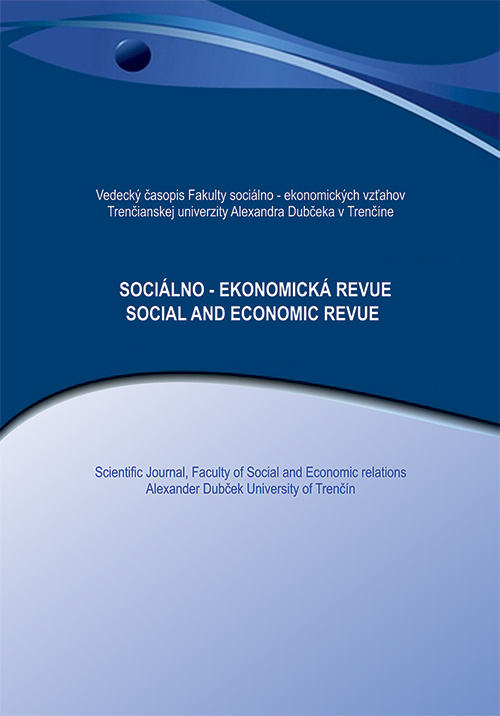MACROENVIRONMENTAL FACTORS AFFECTING HUMAN RESOURCE MANAGEMENT – CASE OF SLOVAK REPUBLIC
Today's companies operate under the conditions of many factors of micro and macro environment and every mistake can cost them a market position. More than ever, their success depends on the human resource management (HRM) and the quality of their managerial decisions. Such factors as the shifts in the economy, globalization and technological development have created new demands for organizations and propelled the HRM field in some new directions. These challenges also create numerous opportunities for HRM. The primary objective of the paper is to identify factors of macro environment currently most affecting human resources management in enterprises operating in Slovak Republic. Paper provides integrated review of theoretical background with an attempt to offer modern sophisticated methods for dealing with the impact of these factors and, also empirical insight of the researched issue. The awareness of the importance of human capital, the necessity to apply modern technologies not only in the production of products and services, but also in all activities related to HRM, and last but not least, the quality of HRM are essential for companies to succeed in competitive struggle.
Release: 2018/3 Pages: 15-22 JEL classification: O10, J20, M20
DOI:
Keywords: human resource management, macro factors, managerial decisions, personnel management
Section: HUMAN RESOURCES AND PERSONNEL MANAGEMENT
Contacts:
Ing. Natália Letková,
Department of Management and Development of Human Resources
Faculty of Social and Economic Relations
Alexander Dubček University in Trenčín
Študentská 3, 911 50 Trenčín, Slovensko
e-mail: natalia.letkova@tnuni.sk
Literature:
Anker, R. (2011). Conditions of Work and Employment Series No. 29. Estimating a living wage: methodological review. Geneva: Intarnational Labour Office, 49-53.
Cardy, R. L., Miller, J. S. (2005). eHR and performancemanagement: A consideration of positive potential and the dark side. In H. G. Gueutal, & D. L.Stone (Eds.), The Brave New World of eHR: Human Resources Management in the Digital Age. San Francisco: Jossey Bass, 138–165.
European network of European Services of Employment – Eures. (2016). Slovakia –information about labour market. [online]. [cit.2018-04-28] Available: https://ec.europa.eu/eures/main.jsp?acro=lmi&lang=sk&parentId=0&countryId=SK
Europe 2020 A European strategy for smart, sustainable and inclusive growth [online]. [cit.2018-04-28] Available: http://ec.europa.eu/eu2020/pdf/COMPLET%20EN%20BARROSO%20%20%20007%20-%20Europe%202020%20-%20EN%20version.pdf
Fetherstonhaugh, B. (2017). The future of careers: 3 big questions answered. Forbes. [online]. [cit.2018-04-28]. Available: https://forbes.com/sites/nextavenue/2017/01/11/the-future-of-careers-three-big-questions-answered/#231a4482f24e.
Noe, R., Hollenbeck, J., Gerhart, B., Wright, P. (2016). Human Resource Management: Gaining a Competitive Advantage. The competitive challenges. McGraw -Hill Education, 8-9.
Letková, N., Martošová, A., Škrovánková, K. (2018). Personnel marketing as a new development stage of employer branding. Proceedings of the 1st international conference contemporary issues in theory and practice of management: CITPM 2018. Czestochowa: Wydawnictvo Wydzialu Zarzadzania Politechniki Czestochowskiej, 345- 352.
Mura, L., Ključnikov, A., Tvaronavičiene, M., Androniceanu, A. (2017). Development Trends in Human Resource Management in Small and Medium Enterprises in the Visegrad Group. Acta Polytechnica Hungarica, 14 (7), 105 – 122.
Piazza, B. (2016). The Graveyard of employment and the future of jobs. Diplomatic courier: A Global Affairs Media Network. [online]. [cit.2018-04-28]. Available: http://diplomaticourier.com/2016/10/20/graveyard-employment-future-jobs.
Poláková, I., Häuser, S. (2003) Personální marketing. Moderní řízení, 38 (8). Praha: Economia, 46-47.
Sarfati, H. Bonoli, G. (2017). Labour Market and Social Protection Reforms in International Perspective: Parallel Or Converging Tracks? Both welfare and work. Abingdon, New York: Routledge, 19-20.
Stahl, G. Björkman, I., Farndale, E. Morris, S., Paauwe, J. Stiles, P., Trevor, J., Wright, P. (2014). Six principles of global talent management. MIT Sloan Management Review, 53 (2), 25 - 32.
Stein, V. (2015). Human Resources Development in Times of Digitalization: A Dynamization Agenda. [online]. [cit.2018-04-28] Available: https://www.wiwi.uni-siegen.de/pmg/veroeffentlichungen/dokumente/ap_006_hrdevelopment_digitalization.pdf.
Stone, D. L., Deadrick, D. L., Lukaszewski, K. M., Johnson, R. (2015). The influence of technology on the future of human resource management. Human Resource Management Review, 25 (2), 216-23.
Šajbidorová, M., Lušňáková, Z., Brunaiová, Z. (2017). Managerial trends in the development of enterprises in globalization era. Career management. The 7th international scientific conference ICoM_2017, 401-407.
Škrovánková, K., Kostrová, J., Bulko, P. (2017). Comparison of demografic indicators in the Czech Republic and the Slovac Republic and their interconnection with the labor market. Ad Alta: Journal for Interdisciplinary Research, 7 (2),199 – 204.
Štatistický úrad SR. (2017). Trendy v nezamestnanosti. [online]. [cit.2018-04-20]. Available: http://portal.statistics.sk.
Thunnissen, M., Boselie, P., Fruytier, B. (2013). A review of talent management: ‘infancy or adolescence?’, The International Journal of Human Resource Management, 24:9, 1744-1761.
Velšic, M. (2018). Adaptácia obyvateľstva na informačné technológie začína stagnovať. [online]. [cit.2018-05-01]. Available:http://www.ivo.sk/8350/sk/aktuality/adaptacia-obyvatelstva-na-informacne-technologie-zacina-stagnovat
Vojtovič, S., Krajňáková, E. (2014). Development of new economy human capital. Vadyba: Journal of management, 25(2), 145-150.
World Economic Forum (2016, January). The future of jobs: Employment, skills and workforce strategy for the Fourth Industrial Revolution. [online]. [cit.2018-04-28]. Available: https://www.weforum.org/reports/the-future-of-jobs.


